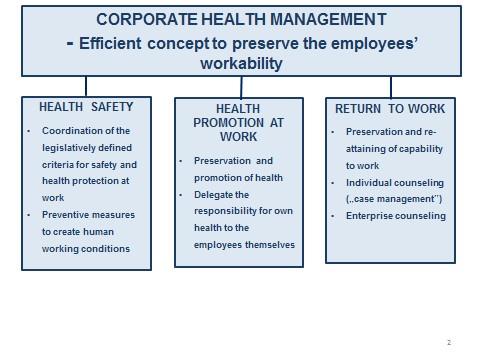Fact Sheet Efficient Corporate Health Management
Fact Sheet: Efficient Corporate Health Management
Historically the risk assessment and risk management has succeeded to reduce the frequency of occupational diseases and work-related (associated) diseases in industrially developed (and wealthy) countries. The image of work and the work environment has been changed in the latest decades significantly.
Occupational psychical strain, which leads to negative stresses, in addition to overloading non-ergonomic and age inappropriate strain of the musculoskeletal apparatus are the major causes of loos of employees’ workability as a consequence of work-related complaints and diseases. Even more, work capability diminishes or makes the subject totally unable to work at his/her job. Work related/associated diseases cause not only considerable human suffering, but also enormous economic and social costs, due to unemployment, early retirement and knowledge loss for the enterprises and extreme financial burden for the society who compensates for it (pensions, reemployment measures). Therefore creating and keeping a healthy work environment means the application of the concept of multidimensionality of health - in the sense of not only physical, but also mental and social well-being at work.
Work is not only about earning "our daily bread", work involves also many health-promoting components. At work, employees can train and obtain the daily rhythm, achieve personal self-assurance / self-esteem through confirmation of their own values or gain knowledge. These positive aspects of work can only be realized in an appreciative social environment at work.
Employees’ health and their work capability should be considered as key assets to economic success: Workers’ health and financial efficacy depend on each other very closely. Thus the capability to work is a prerequisite for high performance, motivation, creativity, innovation and high quality and efficiency of achievements at work. Exactly these features are going to make a difference in the achievement of financial goals of the company. Efficient and sustainable enterprises will be able to compete and win in competitions. Therefore, it is indeed beneficial for the health of employees to work under appropriate human and supportive conditions, creating of which in turn should be the major task of the HR management - efficient corporate health management. Occupational physicians need to become important collaborators in those teams (in all three pillars of the corporate health management).
Due to the demographic and health policy developments, the role of enterprise health management is currently and will even more so become a crucial policy in the development of sustainable strategies to preserve the work and capability to work. This has arisen from human, social and economic motives. In addition, work-related psychosocial stress, health-promoting work design and the creation of an aging-compliant world of work today are important issues in occupational health.
A holistic understanding of physical and mental capability to work as well as health and social inclusion of all workers, requires the involvement of three interacting strategies:
- The improvement of working conditions and minimizing of occupational risks at the organizational (environmental surveillance, work organization and application of mechanical aids), and individual (medical check-ups and biomonitoring) level – regulated by the municipal legislation
- Health promotion at work - under involvement of employees’ surveys, workplace inspections, as well as participative developing practice oriented proposals for improvement at the workplace.
The motivation to self-responsible, health-conscious behavior on an individual level can be achieved – through sensitization, by raising knowledge and awareness, as well as implementation of health-promoting measures. - Return to work of diseased employees is a very cost-effective measure to retain skills and knowledge in the corporation and reduce costs. For an efficient “return to work” concept – multi-professional teams are being challenged. Social support is offered in a couple of European countries to bring diseased employees back to work.
On an individual basis help is offered by individual counseling, while enterprise counseling of HR departments/teams can be of help to adopt the workplace, implement organizational changes or temporary reduce working hours for the diseased employee to permit adaptation to the returned burdens of challenges work (especially efficient in psychiatric diseases).

Prof. Dr. J. Godnic-Cvar